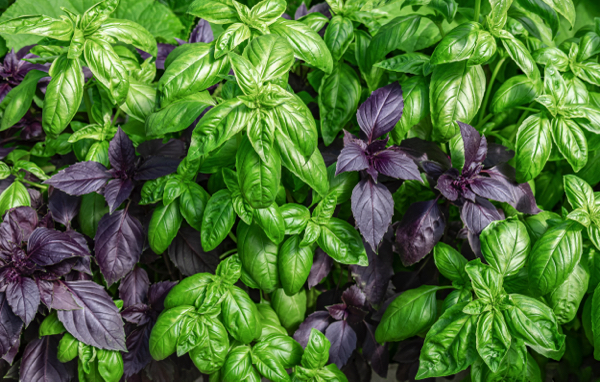Basil nutrient profiles and phytochemical compositions vary widely. While many species share some common traits, such as being rich in anti-inflammatory compounds, antioxidants and essential oils, specific benefits often depend on the variety.
Sweet basil (Ocimum basilicum)
Often referred to as the “king of herbs,” sweet basil is the most widely recognized and commonly used variety. Its regal title stems from its rich history, extensive use in culinary traditions worldwide and impressive range of health benefits. A staple in pesto, salads and sauces, sweet basil boosts a nutrient profile rich in flavonoids, polyphenols and the essential oil eugenol – particularly notable for its anti-inflammatory and antimicrobial properties, which have been linked to potential neuroprotective effects.
By reducing oxidative stress, a key factor in aging and various diseases, sweet basil supports brain health and longevity. Additionally, its high antioxidant content benefits cardiovascular health.
Holy basil (Ocimum sanctum)
Also known as tulsi, holy basil has earned its reputation as the “queen of herbs” in Ayurvedic medicine and is revered for its adaptogenic properties. Widely used as a tea or in traditional remedies, holy basil is rich in eugenol, rosmarinic acid and ursolic acid. These compounds give it adaptogenic properties, helping the body manage stress and even improve cognitive function. Its potent anti-inflammatory and antimicrobial properties add to its broad-spectrum benefits, making it a valuable herb for both the body and brain.
Thai basil (Ocimum basilicum var. thyrsiflora)
Prized for its slightly spicy, licorice-like flavor, Thai basil is a culinary cornerstone in Southeast Asian cuisine. It shares many compounds with sweet basil but boasts higher concentrations of essential oils, like estragole and methyl cinnamate. These oils not only enhance its distinctive flavor but also provide mild antimicrobial effects and support digestive health. Estragole, while beneficial in small amounts, is under scrutiny in large doses.
Purple basil (Ocimum basilicum ‘Purpurascens’)
A visual and nutritional delight, purple basil is rich in anthocyanins – the pigment responsible for its striking color and potent antioxidants that protect against oxidative stress. These compounds may reduce the risk of neurodegenerative diseases and promote cardiovascular health. As a culinary and ornamental herb, purple basil adds both beauty and extra nutritional value to dishes.
Lemon basis (Ocimum basilicum var. citriodorum)
Lemon basil offers a zesty citrus aroma that’s perfect for desserts, seafood dishes and teas. Its key compounds include limonene, eugenol and citral. Limonene, in particular, is particularly noteworthy for its mood-enhancing properties and potential to boost cognitive function. Alongside its bright, citrussy flavor, lemon basil delivers anti-inflammatory and antioxidant benefits – making it both healthful and refreshing.
Cinnamon basil (Ocimum basilicum ‘Cinnamon’)
Adding a warm and spicy flavor to beverages and desserts, cinnamon basil contains cinnamaldehyde and methyl cinnamate that may help improve circulation and regulate blood sugar levels. These benefits extend to brain health as better circulation and glucose balance are critical for cognitive function.
African blue basil (Ocimum kilimandscharicum x basilicum)
Often grown for its ornamental beauty, African blue basil is known for its vibrant appearance and high camphor content. Though often grown ornamentally, it is also used in cooking. Camphor, while stimulating the central nervous system, offers antimicrobial benefits but should be consumed in moderation due to its potency.
Notably, sweet basil and holy basil are among the most researched basil varieties for their health benefits. Other varieties, such as purple and Thai basil, offer unique compounds that may complement health but are not as extensively studied.
Read more stories like this at Herbs.news.
Watch this video about how to tincture tulsi basil (holy basil).
This video is from the Perma Pastures Farm channel on Brighteon.com.
More related stories:
Plant cures: Uses and benefits of basil essential oil.
Health benefits of basil including stress reduction, improved heart health.
Foods, herbs and spices that uplift, refresh and restore the spirit.
Sources include:
Healthline.com
Pubmed.NCBI.NLM.NIH.gov
Brighteon.com
Read full article here


